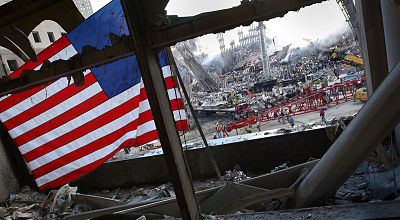9/11 Survey: Americans Struggling With What it Means to Be American
Ten years after the terrorist attacks of Sept. 11, 2001, a major national survey finds America continuing to struggle with what it means to be American and wrestling with how to resolve political, religious and ethnic differences in an increasingly diverse country.
Americans believe they are safer, but that they have less personal freedom and that the country is less respected in the world than it was prior to Sept. 11, 2001, a new major national survey from Public Religion Research Institute finds.
The survey is the basis for a new joint report entitled What it Means to be American: Attitudes in an Increasingly Diverse America Ten Years after 9/11. The report was co-authored by Dr. Robert P. Jones and Daniel Cox of Public Religion Research Institute and E.J. Dionne and William A. Galston of the religion, policy and politics project at the Brookings Institution.
“Ten years after 9/11, Americans continue to grapple with issues of security, tolerance and pluralism—matters that lie at the heart of what it means to be American,” says Jones, CEO of Public Religion Research Institute. “Americans strongly affirm broad First Amendment principles and respect for difference, but they don’t always apply these principles evenly or consistently, particularly with regard to American Muslims and immigrants.”
The survey finds Americans struggling with their views of American Muslims. On the one hand, most Americans (54 percent) agree that Muslims are an important part of the U.S. religious community, and most report being generally comfortable with Muslims in a variety of social settings. On the other hand, Americans employ a double standard when evaluating violence committed by self-identified Christians and Muslims. More than 8-in-10 (83 percent) Americans say self-proclaimed Christians who commit acts of violence in the name of Christianity are not really Christians. In contrast, less than half (48 percent) of Americans say that self-proclaimed Muslims who commit acts of violence in the name of Islam are not really Muslims.
“Television news media also plays a powerful role in influencing views towards American Muslims,” said Cox, PRRI research director. “Americans who say they most trust Fox News are significantly more likely to hold negative views about Islam and American Muslims.”
“The ambivalence in the U.S. on the subject of immigration is one of the most powerful messages of the survey,” said Galston of Brookings. “A solid majority supports a path to citizenship, but a slim majority also supports deportation of illegal immigrants. These tensions suggest that there is considerable room for persuasion and leadership.”
Despite ambivalence on broader solutions, the survey finds solid support for the basic tenets of the DREAM Act: allowing illegal immigrants brought to the U.S. as children to gain legal resident status if they join the military or go to college (57 percent favor, 40 percent oppose).
“The survey underscores that the country is in the midst of the kind of argument it has had again and again over diversity and immigration, and that this debate now has a strong partisan and ideological dimension, which it has not always had,” said Dionne of Brookings. “The generational patterns—young people on the whole are more sympathetic than their elders to both immigration and diversity—suggest that over the long run, we will resolve these arguments, as we have in the past, in favor of inclusion. But in the short run, it will be a difficult and, at times, divisive debate.”














































